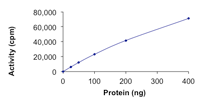
FGFR3 (V555M), Active(F06-12GG)
FOR BULK ORDER REQUESTS PLEASE CONTACT US
Description :Recombinant human FGFR3 (V555M) (397-end) was expressed by baculovirus in Sf9 insect cells using an N-terminal GST tag.
Species :Human
Tag :GST tag
Expression System:Sf9 insect cells using baculovirus
Sequence :397-end (V555M)
Genbank Number :NM_000142
Specific Activity :Sample Kinase Activity Plot. For specific information on a given lot, see related technical data sheet.
Purity :Sample Purity Data. For specific information on a given lot, see related technical data sheet.
Storage, Stability and Shipping :Store product at –70oC. For optimal storage, aliquot target into smaller quantities after centrifugation and store at recommended temperature. For most favorable performance, avoid repeated handling and multiple freeze/thaw cycles.
Applications :Kinase Assay
Molecular Weight :~73 kDa
Gene Aliases :ACH, CEK2, JTK4, CD333, HSFGFR3EX
Scientific Background :Fibroblast growth factor receptor 3 (FGFR3) is part of a family of fibroblast growth factor receptors that share similar structure and function. FGFR3 plays a role in several important cellular processes, including regulation of cell growth and division, determination of cell fate, formation of blood vessels, wound healing and embryo development (1). FGFR3 is involved in the development and maintenance of bone and brain tissue. Mutations in FGFR3 have been implicated in causing bladder cancer, cancer of white blood cells (multiple myeloma) and cervical cancer (2).
References :
1. Chen, L. and Deng, C.X. Roles of FGF signaling in skeletal development and human genetic diseases. Front Biosci. 2005; 1(10):1961-1976.
2. Mhawech-Fauceglia, P. et al. 2006. FGFR3 and p53 protein expressions in patients with pTa and pT1 urothelial bladder cancer. Eur. J. Surg. Oncol. 2006; 32(2):231-237.
Product Sheets (By Lot #) :
Research Areas :AKT/PKB Pathway, Angiogenesis, Cancer, ERK/MAPK Pathway, Receptor Tyrosine Kinases, Cancer, AKT/PKB Pathway, ERK/MAPK Pathway, Angiogenesis, Receptor Tyrosine Kinases
